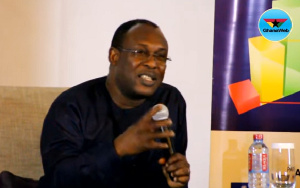 Kofi Bentil, an honorary Vice President of the think tank IMANI Africa
Kofi Bentil, an honorary Vice President of the think tank IMANI Africa
•Kofi Bentil has called for a review of Article 71
•Article 7 deals with emoluments for some key office holders
•He says the provision in its current poses a threat to Ghana’s democracy
Kofi Bentil, an honorary Vice President of the think tank IMANI Africa, has called for an overhaul of the entrenched constitutional provision Article 71 of the Constitution.
Speaking on Joy News on Saturday, July 17, as monitored by GhanaWeb, Kofi Bentil noted that Article 71 in its current state poses a threat to the country’s democratic development.
He, therefore, made a case for the total review of the provision to ensure that it is in sync with current demands.
“Article 71 is obscene, and it is one of the threats to this democracy, and everybody agrees that it is wrong. I think there is a solution to it and that is all those Article 71 [office holders] can get multiple times the minimum wage. So if the minimum wage is one [Ghanaian] cedi, we can give them 10,000 times that. In that way, it will adjust itself automatically as the minimum wage adjusts itself.”
Bentil’s submission was in relation to the trending national conversation about emoluments for Article 71 office holders.
Article 71 office holders include the President, the Vice-President, the Speaker of Parliament, the Chief Justice and Justices of the Supreme Court, Members of Parliament (MPs), Ministers of State, political appointees, and public servants with salaries charged to the Consolidated Fund but enjoying special constitutional privileges.
Earlier on in the same news programme, Samuel Okudzeto Ablakwa, an MP and former deputy minister intimated why it will serve the country’s interest to do an overhaul of Article 71.
“I have long held the view that the entire Article 71 emoluments regime is in urgent need of a major overhaul.
We need to demolish this apartheid superstructure and create new conditions of service framework for public officials which are more equitable, transparent, justifiable, and acceptable to the people who employ us.”